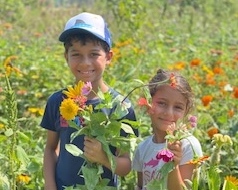4 Reasons to Say “Yes” To Spring Break Camp
Kids need certain ingredients to thrive—quiet time for reading and learning; structured tasks to build esteem and learn responsibility; fun activities to make new memories; exercise to keep mind and body sharp; and alone time to develop independence. Public school break week is fast approaching: April 11th to 22nd. If you haven’t made plans yet, consider sending your kids to Spring Break Camp to keep them off the computer and thriving during their days away from school.
Benefits of Spring Break Camp
- It provides structure. Kids who grow up with predictable daily routines are less likely to have attention deficits, self-control challenges, and time management issues as adults, according to University at Albany psychologist Jennifer Weil Malatras. Spring break camp provides a structured routine that keeps kids engaged with learning and off screens.
- Make new friends. Socialization is an important aspect of child development. Laurie Kramer, professor of applied family studies at the University of Illinois, noticed that children grow up with different social competencies if they have close relationships with a sibling or peers. “Growing up just with parents is a different environment for young people,” Kramer says. She recommends that parents of only children seek ways to help their child “have social experiences with other children, whether that’s through childcare, preschool, or play dates.” Social interactions with kids the same age fosters cooperation, personality development, respect, communication competence, and problem-solving abilities. At least one study found a direct correlation between camp and improved ability to read social-emotional cues.
- Build your child’s memory. Researchers have found that camps are educational, and not just “recreational.” One study found that children at a four-day zoo camp performed 35 to 64 percent higher on test scores about animal classification that kids who hadn’t attended the real-world experience. The findings “highlight the enriching potential of real-world programs like summer camps,” explained Layla Unger, a postdoctoral researcher at Ohio State University. “This suggests organization of knowledge doesn’t require years to happen; it can occur with a short, naturalistic learning experience.”
- Help your child discover new hobbies and skills. It can be difficult to find a sport, activity, or hobby for your child, but camps provide exposure to a number of different opportunities to see what sticks. A spring break camp might include arts and crafts activities, nature and science, music and culinary skill building, theater and physical activity.
American Camp Association surveys highlight the impact camp can have on how children view themselves and how they perform in school:
“I was more confident; I wanted to know everything.”
“I learned a lot about how to control my anger.”
“I feel like I am accomplishing something by being here.”
“I feel that I am better at interacting with friends and family.”
“When I’m at camp I feel that I can be more open with others and myself.”
“I learned to listen… and cooperate with people who have different opinions.”
“I can do more and be proud with myself.”
“I learned to have fun, be a leader, discipline, and most of all – respect.”
“My experience helped me look at challenging situations differently instead of giving up.”
“At camp, I am totally at ease because of the constant fun, activities, and emphasis on self-discovery.”
Need a Little Extra Sunshine This Spring?
Come see us at the new Shine studio! We offer half-day and full-day spring break camps for children ages 3-12, as well as flexible on-demand workshops and at-home or park classes. If you have an open day, we can fill it with creative programming based on a memorable theme. Contact us at info@shinenyc.net for details.



